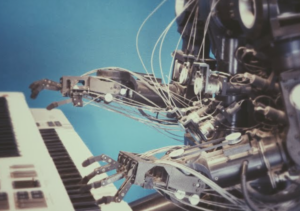A new soft robotic glove offers hope to piano players who have suffered a disabling stroke or other neurotrauma. By combining flexible tactile sensors, soft mechanisms and artificial intelligence, this robotic glove senses the difference between correct and incorrect versions of the same song and combines these features into a single hand exoskeleton.
Unlike previous exoskeletons, this new technology helps restore finger movements through precise force touches and instructions.
For people who have suffered a stroke or other neurotrauma, everyday tasks can be extremely difficult because of reduced coordination and strength in one or both limbs. These issues have prompted the development of robotic devices to help improve their capabilities. However, the stiffness of these assistive devices can be problematic, especially for more complex tasks such as playing a musical instrument.
A soft robotic arm exoskeleton developed by researchers at the University of Florida’s College of Engineering and Computer Science uses artificial intelligence to improve hand dexterity. By combining flexible tactile sensors, soft mechanisms and artificial intelligence, this robotic glove is the first to “feel” the difference between correct and incorrect versions of the same song and combines these features into a single hand exoskeleton.
“Playing the piano requires complex and highly skilled movements, and relearning involves restoring and retraining certain movements or skills,” noted one researcher involved in the project. “Our robotic glove consists of soft, flexible materials and sensors that provide people with gentle support and assistance in relearning and restoring motor skills.”
The researchers integrated special sensors into each fingertip of the robotic glove. By tracking and responding to users’ movements, the robotic glove provides real-time feedback and adjustments, making it easier to master proper movement techniques.
Source: Science Daily

